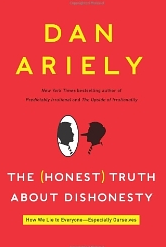Here’s the quotes I found most interesting from The (Honest) Truth About Dishonesty: How We Lie To Everyone – Especially Ourselves by Dan Ariely. As always, if you like the quotes, please buy the book here.
 “People are more apt to be dishonest in the presence of nonmonetary objects – such as pencils and tokens – than actual money.” (34)
“People are more apt to be dishonest in the presence of nonmonetary objects – such as pencils and tokens – than actual money.” (34)
“The more cashless our society becomes, the more our moral compass slips.” (34)
“Generally speaking, if you wear down your willpower, you will have considerably more trouble regulating your desires, and that difficulty can wear down your honesty as well.” (106)
“We should face situation that require self-control-a particularly tedious assignment at work, for example-early in the day, before we are too depleted.” (115)
“The bottom line is that we should not view a single act of dishonesty as just one petty act. We tend to forgive people for their first offense with the idea that it is just the first time and everyone makes mistakes. And although this may be true, we should also realize that the first act of dishonesty might be particularly important in shaping the way a person looks at himself and his actions from that point on – and because of that, the first dishonest act is the most important one to prevent.” (137)
“We have a gut feeling about what we want, and we go through a process of mental gymnastics, applying all kinds of justifications to manipulate the criteria. That way, we can get what we really want, but at the same time keep up the appearance – to ourselves and to others – that we are acting in accordance with our rational and well-reasoned preferences.” (167)
“The individuals who were more creative also had higher levels of dishonesty. Intelligence, however, wasn’t correlated to any degree with dishonesty.” (176)
“I think that these results suggest that once something or someone irritates us, it becomes easier for us to justify our immoral behavior.” (178)
“(In our vending machine) we almost tripled sales by probabilistically giving people back their money.” [70% chance of paying full price of $1.00, 30% chance of getting all their money back/free] (194)
“It’s important to realize that the effects of individual transgressions can go beyond a singular dishonest act. Passed from person to person, dishonesty has a slow, creeping, socially erosive effect.” (214)
“Whereas altruism can increase cheating and direct supervision can decrease it, altruistic cheating overpowers the supervisory effect when people are put together in a setting where they have a chance to socialize and be observed.” (228)
“This study suggests that as dentists become more comfortable with their patients, they also more frequently recommend procedures that are in their own financial interest. And long-term patients, for their part, are more likely to accept the dentist’s advice based on the trust that their relationship has engendered.” (230)
“Very few people steal to a maximal degree. But many good people cheat just a little here and there by rounding up their billable hours, claiming higher losses on their insurance claims, recommending unnecessary treatments, and so on.” (239)
“The amount of cheating seems to be equal in every country – at least in those we’ve tested so far.” (242)
“Negative emotions (like sadness) by themselves do not create a desire for self-inflicted pain. However, those in the guilty condition were far more disposed to self-administering higher levels of shocks.” (251)
If you liked the quotes, please buy the book here.

